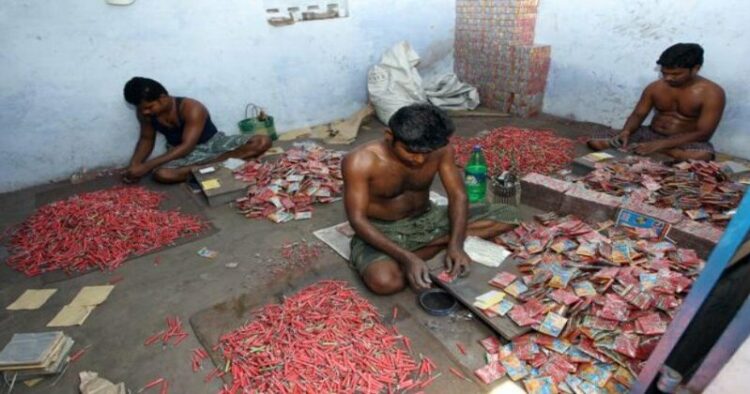The apex court had banned the use of barium in 2018 in making firecrackers and it was reconfirmed in 2021, putting the fireworks industry in Sivakasi the firecrackers’ hub of the country and around three lakh workers directly employed in around 1,000 organised units there, in a tight spot. Production of fireworks in Sivakasi, Virudhunagar district, is yet to pick up even as there is just a month to go for the festival of lights Diwali
Firecracker manufacturers in Sivakasi in Tamil Nadu are a worried lot that the prevailing Supreme Court ban on barium in the fireworks industry could take away the glitter out of the business in the upcoming Diwali season. The apex court had banned the use of barium in 2018 in making firecrackers and it was reconfirmed in 2021, putting the fireworks industry in Sivakasi the firecrackers’ hub of the country— and around three lakh workers directly employed in around 1,000 organised units there, in a tight spot. After the SC had reconfirmed the ban in 2021, many of the stakeholders have impleaded in the case seeking lifting of the ban.
A Murali, Vice President, Sivakasi Fireworks Manufacturers Association said “The ban of barium is baseless imposed without any scientific study being conducted on the possible hazardous impact with regards to the pollution. Murali said there are three lakh people employed in the Sivakasi belt alone, with another four lakh indirectly who are supplying raw materials like chemicals and printed boards, among others. “ We are being targeted because of the hue and cry of the environmentalists in the name of pollution, although other sectors as well are using barium in various production operations. I should say that we are the weaker opponent and are being made scapegoats,” he said.
According to him, barium is one of the main oxidisers for most of the fireworks and with the ban, they are unable to make a lot of products. “ After the ban, my factories are running at 50% capacity and reduced production by 50% to 60% which obviously impacted the business. For instance, I have a group of companies which employs 450 to 500 workers and after the ban I could employ 200 people only,” he said.
Sivakasi Sparklers Manufacturers Association, Vijaykant Said that fireworks emission standards are to be fixed by involving the manufacturers and the ban on the use of barium has to be lifted. “The manufacture of joint crackers is already allowed as per explosives rules, 2008 in such a way that the noise of individual crackers is not above the noise pollution norm. This condition has to be restored. As for Delhi or any other place where the ambient air quality index is above 200, the current two-hour stipulation for bursting crackers itself will help achieve the 30% reduction in emission from fireworks. For the rest of the country, the two-hour restriction has to be relaxed,” he said.
With the ban, many organised players believe that manufacturing has turned into the paradise of bootleggers, workers were found migrating to illegal manufacturers for want of jobs jeopardizing their safety.
S Ravi , Friends of Fireworks said “ Diwali is just a month away, but manufacturers from Sivakasi are tense as sales haven’t picked up yet. The city of Sivakasi in Tamil Nadu, which accounts for 90 percent of Indian firecracker manufacturing, stares at a dark Diwali this year as production has been reduced to just over 40 percent due to court restrictions. The firecracker industry is home to 1,070 registered firecracker units and provides jobs to around 8 lakh people.
Diwali is just a month away, but manufacturers from Sivakasi are tense as sales haven’t picked up yet. “The ban on the sale of firecrackers for Diwali imposed over the past three years due to COVID-19 and environmental concerns in several states have already brought down the industry. The Supreme Court ban on barium in the fireworks industry took away the glitter from the business. The industry was estimated with a business volume of Rs 6000 crore even a few years ago. It has been drastically reduced to Rs 3500 crore due to the ban. He predicted that there will be a shortage of firecrackers this year due to the impact of low production.
S Srinivasan,Chief Technical Advisor, Sivakasi Fireworks Manufacturers Association said “ The price of crackers has gone up by up to 40 percent this year due to higher prices of raw materials than usual. At the same time, some companies have introduced many new crackers this year. Fireworks sales are expected to heat up from next week onwards. He also pointed out that “at the same time last year, 60 percent of crackers were booked and sold out. But now even 30 percent of crackers are not sold. This makes it impossible to predict how the firecracker sales will be this year.”
By this time of the year, the dispatches should be going on in full swing, but that is not the case now. Now, all eyes are on the Supreme Court and manufacturers of the fireworks industry are waiting for its final decision that will determine the fate of the industry.




















Comments